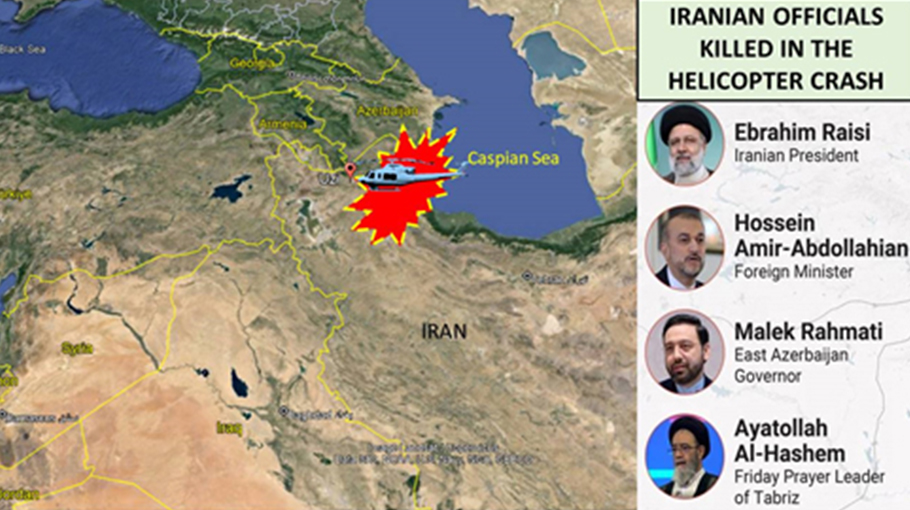The death of Iranian President Ebrahim Raisi-A wider prismatic vision

Iranian President Ebrahim Raisi, a widely seen as a potential successor to Supreme Leader Ayatollah Ali Khamenei, was killed on 20 May 2024 along with other accompanying high officials when his Bell-212 helicopter crashed in extremely poor weather in mountains between Jolfa and the border region Varzaqannear the Azerbaijan border. They were returning following a joint inauguration of the Qiz-Qalasi Dam over the Aras River with the Azerbaijani president, with the crash site located by a Turkish Akinci Drone. This is the second abnormal death of a sitting Iranian president, after a 1981 Iranian Mojahedin-e Khalq assassination of the then President Mohammad-Ali Rajai.
Vice president Mohammad Mokhber, close to Khameinei, and ingood ties with the Islamic Revolutionary Guard Corps (IRGC)took over as the interim President, declaring 28 June 2024 as the next elections.Iran's long-time nuclear negotiator Ali Bagheri was nominated as acting foreign minister to replace the deadHossein Amir-Abdolahian.
The so far established cause of death of Raisi was his helicopter crash in poor weather. However, conspiracy theorists assert, how out of three, only Raisi’s helicopter went down – backed up by a Turkish analysis of the absence of any signaling device on board the chopper. Many raise fingers towards US technological sanctions and seemingly logical potential Israeli intelligence involvements, which, of course, does not have records of targeting heads of states. Israel rather traditionally targets Iran’s military and nuclear targets (including scientists),instead of high-profile political assassinations.Eliminating a sitting president, a direct act of war, would provokeausterekinetic Iranian responses.
The powerful figureheads expected to be in the Presidential race include former IRGC General and former mayor of Tehran Mohammad-Bagher Ghalibaf. He not being a cleric can be president, but not Supreme Leader .Others include Alireza Arafi, member of the “Assembly of Experts”, a group in charge of selecting a new supreme leader. Though prospective, Khamenei's opposition and negative public sentiment to hereditary rule would also likely eliminate both his own son Mojtaba Khameini and Iraq based Ali Khomeini, a grandson of the Islamic Republic's founder Ayatollah Khomeini from the race.Influential actors like the Islamic Revolutionary Guard Corps (IRGC, aka, Pasdaran), the ultra-conservative secretive but influential Paydari Front,military and intelligence apparatusand prominent clerics in Qom are expected to exert influence on President’s selection. Iran’s influential 12-member Guardian Council overseeing Iran’s elections and legislation (Shourā-ye Negahbān) will also get involved with the aforementioned elements.
Interestingly, prospects of covert/ discreet foreign patronization for the feudal sides favouringa moderate regime vying for power may not be ruled out. Such successful shaping operations could hugely influence Iran’s supply of killer drones/ ballistic missiles to Russia in the Russo-Ukrainian crisis, curbing Houthi role in intercepting the Red Sea shipping, support to the “Axis of Resistance”, vis-à-vis, the Syrian Assad regime and re-shaping Iran-GCC relations.
The near term principal impacts are likely to be domestic rather than international. Despite a covert localized jubilance in terms of fireworks in Raisi's hometown Mashhad among the opposition following the helicopter crash, a mass popular uprising and leadership change is less likely.NotwithstandingIranian government being unpopular among many, it still draws respect for its strength internally, regionally and also in extra-regional domain.The Iranian political establishment has a roughly analogous interpretation of Iran’s international policies. The Iranian foreign policy, controlled by the Supreme Leader Ali Khamenei and the influential hard line IRGC (Pasdaran) is less likely to show changes. An elected hardliner could intensify confrontations, while a more moderate leadership might seek to de-escalate tensions, raising hopes ofa revived JCPOA, improved relations between Iran and Western countries, regional stabilization and providing economic relief to Iran.
The ultimate Iranian objective is to ensure regime survival, evading domestic unrests and external threats.The other key considerationsinclude safeguarding its nuclear programmes, relations with USA, West, Gulf countries and Israel, maintain domestic order and control over its Non-State Actor (NSA) proxies like Hezbollah, Hamas, Iraqi Militia and the Yemeni Houthis. Iran’s military approaches as well as its backing for Hamas and Hezbollah proxy militias may see changes. Raisi’s death could either embolden the proxies, perceiving a destabilized Iran, or contract Iran’s backing due to Iran’s internal chaos consumes the government’s attention. This shift could create unpredictable effects on Iran-Israeli security dynamics,alter the dynamics of ongoing conflicts in the Middle East, with potential ramifications for regional security and stability.Stock markets, Oil and gold prices and demands will fluctuate. Any potential disruption in Iran’s oil production or exports, could cause a spike in oil prices leading to cascading effects on the global economy, mainly for countries heavily reliant on oil imports.The long-term consequences will depend on Iran’s political stability and policy directions.
Iran is known to have asked Moscow and, also specially Washington to help locate Raisi’s helicopter.
This, coupled with Iranian indirect contact with the West prior to its April missile/ drone barrage against Israel may be a tacit Iranian signal for a desired non-hostile future relationship with the West.
Likewise, basic US approach to Iran for nowfocuses upon keeping communication channels open to evade any conflict or a crisis in light of upcoming November elections.
Iran and the world wait for 28 June 2024…...
Author TasniaTasnimHossain, is an International Relations (IR) Student at the Bangladesh University of Professionals (BUP) and a multiple award winner of “Model United Nations (MUN)” competition sessions. Email: hossaintasnia08@gmail.com




